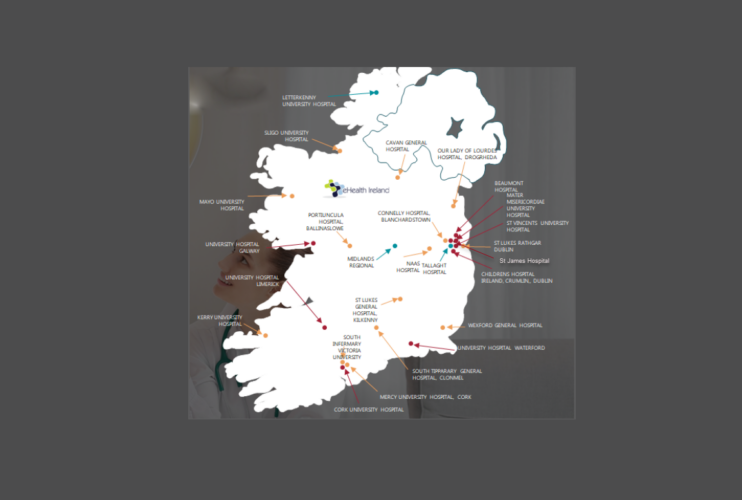
Summary
Ireland provides cancer care and Systemic Anti-Cancer Therapy (SACT) at centres across the country, but administration of care can be hindered by a lack of access to patient clinical information, resulting in delays to care and an increase in SACT administration errors.1 2 Clinicians recognised the negative impact of limited information-sharing, and engaged policymakers to include a National Electronic Prescribing System in the National Cancer Strategy.3 This political engagement resulted in the design and implementation of a National Cancer Information System (NCIS). The system is a repository of patient clinical information that allows easy access to records, streamlines SACT prescribing and administering, and documents and records multidisciplinary meetings.2 While the NCIS is still being rolled out, it has anecdotally improved efficiency in care provision, reduced medication errors and increased patient satisfaction.3 The co-creation of the system with clinical and IT stakeholders has been cited as a key element of the programme’s success, along with continued evaluation and improvements based on feedback from the National User Group that shares implementation experience and learnings.3 4
Challenge
Ireland has nine designated cancer centres – eight adult and one paediatric – and 26 additional sites that can administer Systemic Anti-Cancer Therapy (SACT).2 Cancer patients often receive initial diagnoses at cancer centres and then go on to receive SACT and follow-up care at smaller centres.5 This hub-and-spoke model of care provides access to cancer care, but service provision can be varied and delayed due to issues around sharing patient information.2
Healthcare professionals being able to access accurate and complete patient health information is a key factor in providing efficient cancer care. While Ireland has a national cancer registry, the information collected is used for overall epidemiological analysis, not individual care provision.6
Healthcare professionals have stated that a lack of access to comprehensive clinical patient information results in delays to care and an increase in errors in providing patients with SACT, which can result in serious complications.1 Irish healthcare professionals have cited a lack of information-sharing between healthcare locations, limited/lack of centralised IT infrastructure and systems, and unavailability of patient records as risk factors for medication errors.1
Solution
Irish healthcare professionals worked to engage policymakers to recognise the issues around clinical information-sharing in Ireland.1 3 This engagement led to the founding of the National Cancer Control Programme (NCCP) – a directorate responsible for converting research into action to improve the provision of cancer care in Ireland – including the implementation of a National Electronic Prescribing System in the National Cancer Strategy.3 7 Continued engagement from clinicians led the Health Service Executive – Ireland’s publicly funded healthcare system – to develop and implement the National Cancer Information System (NCIS).1 2 The NCIS is a computerised system that records and stores information relevant to a patient’s cancer care.2
The information stored includes:2
- Name and address
- Medical history
- Type of cancer diagnosis
- Treatment options
- Current cancer drug routine
As well as holding clinical patient information, the NCIS supports the prescribing and compounding of medication to reduce errors, and facilitates multidisciplinary meeting documentation and reporting.1 The NCIS hopes to provide:4
- Safer and more equitable treatment
- Real-time, secure access to patient records and clinical notes
- Improved and faster access to treatment and diagnoses
- Cost effective use of staff and medicines
- Business intelligence to assist in future treatment scheduling, thus improving the patient journey.
The NCIS was launched in 2019, with St Luke’s Hospital Rathgar being the first location to implement the system.
What has been achieved?
Since its inception, the NCIS has been rolled out in 19 of the 26 available locations.3 While a full evaluation of the system has yet to be carried out, anecdotal evidence has shown that the use of the system has reduced errors in medication dispensing, improved efficiency in care provision, and increased patient satisfaction.3 The system is being used to improve medication management as well as the management and documentation of multidisciplinary meetings.3
Learnings have already been used from the initial pilot sites to improve the roll-out of the service. The NCCP facilitates a national user group that meets every 6–8 weeks to share implementation stories and experiences. Key updates are grouped into technical (e.g. upgrading servers, changing messaging interfaces), configuration (e.g. adjustment of software settings) and development (e.g. working with the vendor to enhance the software).3
Another key learning is that clinical staff need to work closely with IT staff to optimise implementation system and achieve success.3 This co-working should begin during system planning to ensure that solutions are suitable technically and clinically. Stakeholder involvement in the design of the programme was a key factor in the system’s success.3
Next steps
The NCIS will continue to be rolled out across all sites in Ireland. As the system is fully implemented, it will be continuously improved based on evaluations and learnings.3 Continued development and improvement of the NCIS system aims to improve the quality and safety of cancer care whilst improving patient journeys and streamlining clinician care administration.4
References:
- Health Service Executive. 2024. FAQs - National Cancer Information System. Available here: https://www.hse.ie/eng/services/list/5/cancer/profinfo/medonc/projects/frequently%20asked%20questions%20-%20ncis.html [accessed: November 2024]
- Health Service Executive. 2024. NCIS - About the National Cancer Information System. Available here: https://www.hse.ie/eng/services/list/5/cancer/profinfo/medonc/projects/mocisproject.html [accessed: November 2024]
- Carroll G. 2024. Personal communication via email [accessed: November 2024]
- Kidd P. 2022. Our experience implementing the National Cancer Information System (NCIS) in Galway University Hospitals. Available here: https://hospitalprofessionalnews.ie/2022/06/03/our-experience-implementing-the-national-cancer-information-system-ncis-in-galway-university-hospitals/ [accessed: November 2024]
- Citizens Information. 2024. Types of cancer services. Available here: https://www.citizensinformation.ie/en/health/health-services/cancer-services/cancer-services/ [accessed: November 2024]
- National Cancer Registry Ireland. Data we collect. Available here: https://www.ncri.ie/data/data-we-collect [accessed: November 2024]
- Department of Health. 2017. National Cancer Strategy: 2017-2026. Dublin